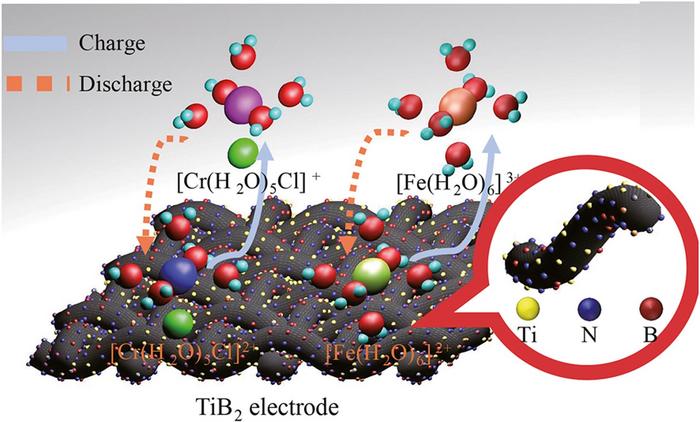
Credit: GREEN ENERGY AND INTELLIGENT TRANSPORTATION
Iron-chromium redox flow batteries are pivotal in addressing the challenges of renewable energy sources, such as solar and wind, which often suffer from inconsistency in energy supply. These batteries provide a viable solution for stabilizing energy grids and ensuring a steady energy supply. Traditional carbon cloth electrodes used in these batteries, however, have limitations such as poor electrochemical reactivity and low energy efficiency.
The breakthrough involves the use of a titanium composite carbon cloth electrode that has been doped with boron (B) and nitrogen (N), elements that significantly enhance the battery’s performance. By integrating TiB2 catalysts and applying high-temperature calcination techniques, the researchers created electrodes with enhanced physicochemical properties, increasing the reactivity and efficiency of the batteries.
The modified electrodes exhibited a substantial improvement in discharge capacity and energy efficiency. After 50 charge/discharge cycles, the new electrode achieved a discharge capacity of 1990.3 mAh, significantly higher than the 1155.8 mAh offered by standard electrodes. Additionally, energy efficiency was maintained around 82.7%, a considerable increase compared to the baseline.
These improvements are attributed to the increased surface area and enhanced electrochemical activity provided by the N-B co-doping. The doped electrodes offer more active sites for redox reactions, which are crucial for the energy storage process. Moreover, the introduction of the Ti catalyst further enhances the kinetics of the reactions involved, providing a faster and more efficient energy transfer.
This development not only presents a more efficient way to store and utilize energy but also reduces the cost and environmental impact associated with traditional battery materials. The use of iron and chromium, which are more abundant and less expensive than other metals like vanadium, makes ICRFBs a more sustainable and economically feasible option for large-scale energy storage systems.
The researchers believe that this technology has the potential to significantly impact the renewable energy sector, providing a more reliable and efficient way to integrate renewable sources into the power grid. With further research and development, these doped electrodes could lead to wider adoption of redox flow batteries, supporting a transition towards more sustainable energy solutions.
This advancement represents a key step forward in battery technology, promising to enhance the capabilities of energy storage systems worldwide and support the broader adoption of renewable energy sources, ultimately contributing to global efforts in combating climate change and promoting sustainability.
###
Reference
Authors: Yingchun Niu † 1, Senwei Zeng † 1, Guangfu Wu, Qingtan Gao, Ruichen Zhou, Chuanyuan Li, Yang Zhou 1, Quan Xu 1
Affiliations:
State Key Laboratory of Heavy Oil Processing, China University of Petroleum Beijing, 102249, Beijing, China
Title of original paper: Breakthrough in Battery Technology: Iron-Chromium Redox Flow Batteries Enhanced with N-B Doped Electrodes
Article link:
Journal: Green Energy and Intelligent Transportation
DOI: 10.1016/j.geits.2024.100158
Journal
Green Energy and Intelligent Transportation



